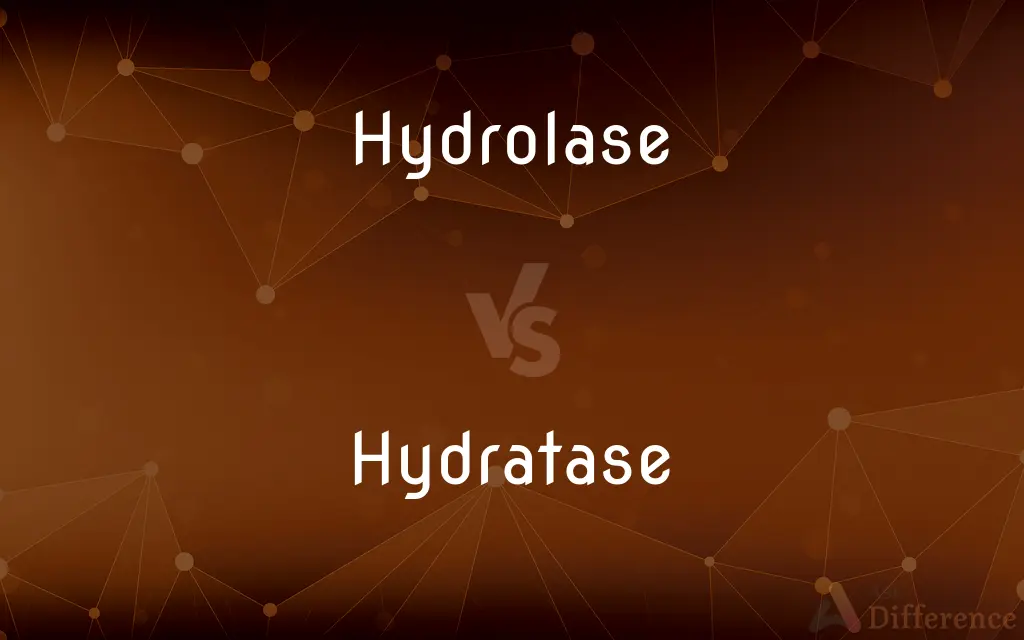Hydrolase vs. Hydratase — What's the Difference?
By Maham Liaqat & Urooj Arif — Updated on March 11, 2024
Hydrolase enzymes catalyze the cleavage of bonds with water addition, whereas hydratase enzymes specifically add water to double bonds without breaking them.

Difference Between Hydrolase and Hydratase
Table of Contents
ADVERTISEMENT
Key Differences
Hydrolases are a broad class of enzymes that catalyze the hydrolysis of various chemical bonds, including ester, glycosidic, peptide, and other bonds, using water. This process often results in the breakdown of complex molecules into simpler ones, facilitating various biological functions such as digestion and metabolism. On the other hand, hydratases, also known as hydro-lyases, specifically catalyze the addition of water to double bonds in a substrate without breaking the substrate into two parts. This action typically involves the conversion of one molecule into another, often playing a crucial role in metabolic pathways like the citric acid cycle.
Hydrolases are involved in critical biological processes across all forms of life, from bacteria to humans, showcasing their versatility in biochemistry. They are essential for recycling cellular components, degrading food into absorbable nutrients, and regulating biomolecules. Whereas hydratases have a more specialized function, mainly involved in specific metabolic pathways, such as the hydration of fumarate to malate in the citric acid cycle or the conversion of 2-acetyl-CoA to acetoacetyl-CoA in fatty acid synthesis, indicating their specialized roles in metabolism.
The activity of hydrolases is fundamental in various industrial and biotechnological applications, including waste treatment, the food industry, and pharmaceuticals, where they are used to synthesize or degrade complex biomolecules. Hydratases, while less widely applied industrially, are crucial in the synthesis of certain pharmaceuticals and chemicals, illustrating their importance in both natural and engineered chemical processes.
Hydrolases can be highly specific to their substrates or exhibit broad specificity, allowing them to act on a wide range of substrates. This diversity makes them indispensable in biological systems for maintaining cellular homeostasis. In contrast, hydratases typically exhibit high specificity towards their substrates, catalyzing hydration reactions in particular substrates within specific metabolic pathways, reflecting their tailored roles in cellular processes.
Understanding the mechanisms and functions of hydrolases and hydratases is vital for advancements in biochemistry and molecular biology. The study of hydrolases has led to significant developments in drug design and the treatment of diseases where these enzymes are involved. Meanwhile, hydratases are studied for their role in metabolic engineering and synthetic biology, aiming to produce novel compounds or improve metabolic efficiencies.
ADVERTISEMENT
Comparison Chart
Function
Catalyzes the hydrolysis of chemical bonds using water
Adds water to double bonds without cleaving the substrate
Substrate Specificity
Broad or specific, depending on the enzyme
Typically very specific to certain substrates
Biological Role
Involved in digestion, metabolism, and cellular recycling
Primarily involved in specific metabolic pathways
Industrial Application
Wide applications in pharmaceuticals, food industry, and waste treatment
Used in the synthesis of pharmaceuticals and certain chemicals
Example Reactions
Breakdown of peptides, fats, and polysaccharides
Conversion of fumarate to malate in the citric acid cycle
Compare with Definitions
Hydrolase
These enzymes are crucial in waste recycling within cells.
Proteases degrade misfolded proteins.
Hydratase
Hydratases play a role in fatty acid metabolism.
Enol-CoA hydratase facilitates the hydration of enoyl-CoA.
Hydrolase
Hydrolases are involved in DNA repair mechanisms by cleaving phosphodiester bonds.
DNAse cuts DNA strands during apoptosis.
Hydratase
Hydratases are enzymes that catalyze the addition of water to double bonds.
Fumarase converts fumarate to malate in the citric acid cycle.
Hydrolase
Hydrolases are enzymes that catalyze the cleavage of chemical bonds using water.
Amylase breaks down starch into simpler sugars.
Hydratase
These enzymes are crucial for the biosynthesis of certain compounds.
Hydratases participate in the synthesis of terpenes.
Hydrolase
They play a key role in the digestion process by breaking down complex food molecules.
Lipases help digest fats by breaking down triglycerides.
Hydratase
Hydratases can influence the production of secondary metabolites.
They are involved in the biosynthesis of antibiotics.
Hydrolase
Hydrolases contribute to the regulation of molecular signaling pathways.
Phosphatases remove phosphate groups from proteins.
Hydratase
They are involved in specific steps of metabolic pathways.
Aconitase hydrates citrate to isocitrate.
Hydrolase
Hydrolase is a class of enzyme that commonly perform as biochemical catalysts that use water to break a chemical bond, which typically results in dividing a larger molecule into smaller molecules. Some common examples of hydrolase enzymes are esterases including lipases, phosphatases, glycosidases, peptidases, and nucleosidases.
Hydratase
An enzyme that removes water from a substrate.
Hydrolase
An enzyme that catalyses the hydrolysis of a particular substrate.
Hydratase
(enzyme) Any enzyme that catalyzes the addition or removal of the elements of water; a hydrase
Hydrolase
Any of a class of enzymes that catalyze the hydrolysis of a chemical bond.
Hydrolase
(enzyme) An enzyme that catalyzes the hydrolysis of a substrate.
Hydrolase
An enzyme which causes the splitting of a chemical bond with the addition of the elements of water; a hydrolytic enzyme. Formerly called a hydrolytic ferment.
Common Curiosities
What is the main difference between a hydrolase and a hydratase?
Hydrolases catalyze the cleavage of chemical bonds using water, while hydratases add water to double bonds without cleaving the substrate.
Can hydratases be used in industrial processes?
While less common, hydratases are used in the synthesis of certain pharmaceuticals and chemicals.
Can hydrolases act on any type of chemical bond?
Hydrolases can act on various chemical bonds, including ester, glycosidic, peptide, and others, depending on the enzyme's specificity.
Are hydratases involved in energy production?
Yes, hydratases are involved in energy production by participating in metabolic pathways like the citric acid cycle.
How do hydrolases contribute to digestion?
Hydrolases break down complex food molecules like proteins, fats, and carbohydrates into simpler molecules that can be absorbed by the body.
Can hydrolase activity be regulated?
Yes, the activity of hydrolases can be regulated by various cellular mechanisms, including allosteric modulation and phosphorylation.
What role do hydratases play in fatty acid metabolism?
Hydratases facilitate reactions in fatty acid metabolism, such as the hydration of enoyl-CoA, a step in fatty acid synthesis.
Are all hydrolases enzyme specific?
Some hydrolases have broad substrate specificity, while others are highly specific to their substrates.
What is an example of a hydrolase enzyme?
Lipase is an example of a hydrolase that breaks down fats into glycerol and fatty acids.
What is an example of a hydratase enzyme?
Fumarase, which converts fumarate to malate in the citric acid cycle, is an example of a hydratase.
Can hydrolases be found in all types of living organisms?
Yes, hydrolases are ubiquitous and play essential roles in the biochemistry of all living organisms.
How do hydratases contribute to the citric acid cycle?
Hydratases, like fumarase and aconitase, contribute to the citric acid cycle by catalyzing hydration reactions essential for energy production.
Do hydratases only work on specific substrates?
Yes, hydratases typically exhibit high substrate specificity, acting on particular substrates within specific metabolic pathways.
How do hydrolases affect pharmaceutical development?
Hydrolases are targeted in drug design for their roles in disease processes, leading to the development of enzyme inhibitors or activators.
What is the significance of hydratases in synthetic biology?
Hydratases are explored in synthetic biology for their potential to produce novel compounds or improve metabolic pathways.
Share Your Discovery

Previous Comparison
Pub vs. Restaurant
Next Comparison
Apostate vs. ReprobateAuthor Spotlight
Written by
Maham LiaqatCo-written by
Urooj ArifUrooj is a skilled content writer at Ask Difference, known for her exceptional ability to simplify complex topics into engaging and informative content. With a passion for research and a flair for clear, concise writing, she consistently delivers articles that resonate with our diverse audience.













































